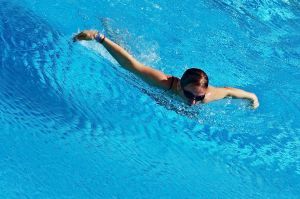In the early 70’s, I was responsible for supplying good swimming pool life guards at a local pool. Many individuals have the wrong impression of a life guard. They think that the person, behind the sunglasses, is busy looking cool from their high perch on their chair. They couldn’t be more wrong. This article examines what it takes to be a good life guard,
Preparing for the Day
When a life guard arrives on the seen for their tour of duty, they check the following. They make sure first aid equipment close by and updated. Floatation devices are easy to get to. There are no obstacles around the pool area. This means putting pool chairs where they belong. Rescue equipment is easily accessible. In some cases, they check the chlorine in the water. They also check the float ropes that go across the pool, to make sure they are secure. Diving boards are rechecked for safety.
Personal Safety
Besides caring for others, they have to keep themselves safe. There is a reason for sunglasses. The glare from the water can cause headaches and eye problems. They often use an umbrella over their chair to prevent the suns rays from burning them. They also need a good sun screen to cut down on the ultraviolet rays. They need non-slip shoes to wear.
Basic Pool Rules
A life guard must enforce the rules and they need a whistle and loud voice to do so. Those rules include no running in the pool area, no horseplay anywhere in the pool area, no hanging on a person in the pool, no glass products in the area, no diving off the edge of the pool and any other rules of safety.
Guard Training
Not anyone can be a life guard. A life guard is an excellent swimmer. They have taken and passed a life guard test and gotten their life guard certificate. Each year this has to be renewed. They also have a certificate in CPR. They are the next best thing to a paramedic.
What Does a Life guard Look for?
Behind those sun glasses, a life guard enforces the rules above. However, they also have to look for things out of the unusual.
They scan the pool for irregular swimming techniques.
They look for someone struggling in the water.
They look for something out of the ordinary and are quick to respond.
Is anyone doing anything dumb?
What is the over all atmosphere of the pool area? Is it laid back or is it very active?
They look at those outside the pool. Do they give an indication of trouble you might have missed?
What is the body language of those in the pool?
A life guard must avoid distractions from those around him. This is why many times a life guard will not start or continue a conversation.
They must continuously scan the pool area from one end to the other.
Note; Some pools have an enforcer that walks around the pool area. They handle everything above and outside the pool. This frees up the guard on their perch to study the water area only.
It is very important that a life guard takes this responsibility seriously.
